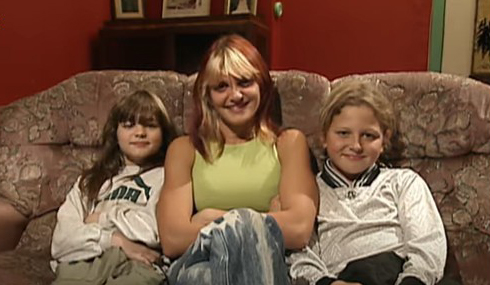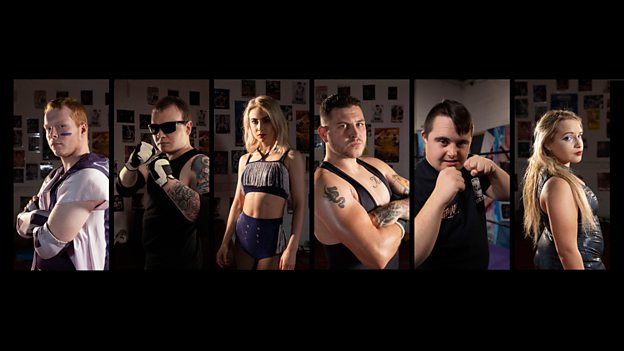Zak Bevis: Stepping Out Of The Ring And Onto TV
Ordinarily when talking to someone like professional wrestler, promoter and trainer Zak Bevis, doing the media rounds to promote his new BBC documentary series ‘Step into the Ring’, you’d maybe travel to the home of the World Association of Wrestling in Norwich, meet some of the wrestlers, then sit down, face to face, and have a chat. Maybe even meet his dad or his mum, British wrestling legends Ricky Knight and Sweet Saraya while you were there. It’s a family business, after all.
But this is 2020, so it was a Zoom call instead. All things considered though, it’s probably lucky for Zak – or to his fans, Zak Zodiac – who, as well as talking to the press about his role in the show (which you can read my review of here), he has also opened up a new facility for WAW, guided his dog through the delivery of her first litter of puppies (“first and last,” says Zak. “It’s been horrendous.”), ran his first post-Covid shows for a socially distanced live crowd – in comparison to a normal show for 400, WAW only admitted 70 people to their comeback – and did all this while being a dad of two.
“It’s crazy at the moment dude,” he says as we begin our chat. Crazy is a word for it, alright.
I start by asking how different a show with no audience (WAW recorded a crowd-free live event just before lockdown to deliver something fresh to fans while they waited for the promotion to return) or a radically reduced crowd felt like. The answer, it seems, is that it hurts more. Much more.
“When you’re bumping on a canvas with no audience, you feel everything. So that audience… they’re your fuel. They’re what gives you the energy to keep getting up. They are your drive – without them, wrestling’s not the same.”
That’s perhaps why it’s so refreshing to catch Zak’s latest documentary series – filmed in the latter half of 2019, pre-Covid, pre-lockdown. It’s almost nostalgic to watch WAW crowds, without masks, enjoying the show. I say “latest”, because this isn’t the first time that cameras have followed Zak and his family around. When it first aired, I’d watched the Channel 4 documentary ‘The Wrestlers: Fighting With My Family’, which told the story of Zak, his sister Saraya-Jade and their attempt to get signed by the WWE (Saraya would go on to be known as Paige after landing a contract with the company). I’d also seen the story told again in the movie ‘Fighting With My Family’ – but as it turned out, Zak’s family, whether he was fighting with them or not, have been in front of the cameras even more frequently than I’d thought. Obligatory embarrassing childhood TV appearance photo coming up (sorry Zak, sorry Paige):

Zak explains: “My earliest memory is when I was three years old. Me and my sister were sharing a bath, bubbles everywhere, and we had a camera there recording my mum for a documentary – Muscles and Mascara, I think it was?” A quick Google after the interview, and sure enough, there it was: a 2001 ITV documentary focusing on Saraya and her battles with another British women’s wrestling legend: Klondike Kate. Zak pauses for a second: “I would say we’ve done a minimum of 15 documentaries, chat shows and everything else. And I think one of things that attracts these guys to make these stories about us is that we’re oblivious to the cameras. If we’re going to have an argument, if I’ve got something to say to dad, we’re going to say it whether there’s a camera there or not. So really the cameras are non-existent in our world. We don’t play up to them. They’re here because they like what we do – let’s not change it or glam it up. Let’s be ourselves, let’s be real, let’s be raw – and that’s why I believe people keep coming back because we’re so raw and honest.”
If you needed evidence of Zak backing up his words, you’ll find them early on in the four-part series. He touches on his understandable disappointment of not getting signed by the WWE at the same time as his sister, and is painfully open about how he feels he let down his son, whose birth coincided with a bout of depression following the WWE knock-back.
“I was a terrible role model to my son for the first six months,” he says, “…because I let the failings of my professional career slip into my personal life. And that’s something that I’ve managed to separate now. I’ve got a personal life and a professional life, and they don’t come together anymore.”
“I’m glad this story’s not about me…”
Zak Bevis
Yet while Zak is conscious of the importance of family time, and the potential impact that moving to the US to chase his dream of working for the WWE would have on them, there’s a wider extended family who are just as dependent on him away from home at WAW. It’s these people, says Zak, that are the real stars of the documentary: not him.
“I’m glad this story is not totally about me,” he admits. “I feel that would put viewers off. For me, I think, having an element of… not draw, but of having people who did watch the movie or the documentary to go: “Oh, Zak! Let’s see what he’s up to now,” that’s fine. But this is their story: a story of inspiration.
“You look at the guys that are participating in this documentary series – they’re inspirational. They’ve all got their own demons, problems, disabilities: we’ve got people with PTSD, autism, Downs Syndrome, mental health issues, and all we’re doing is showing people there’s no such thing as can’t. Nothing can hold you back. If you want something in this world, you can get it. They’re dedicated, they’re passionate, they’re inspirational, and to get them on a massive platform like the BBC is only going to elevate them and help them achieve their dreams – which is to be world-renowned professional wrestlers.”
The idea of chasing that dream brought us somewhat inevitably to the subject of the ‘Fighting With My Family’ movie. I mention how, when watching it, I wasn’t sure how much of the story was real and how much was a little bit of Hollywood spin. Training a young man who is legally blind to wrestle couldn’t have been real… right? Well, the ‘Step into the Ring’ series shows that it absolutely was. In fact, Zak summarises, the only bit of Hollywood embellishment was the most electrifying man in sports entertainment himself: The Rock.
Zak explains: “He was the ‘Hollywood’ that they added into the movie. The only connection the Rock had is he found our documentary, he watched it and he was empowered by it. It reminded him of his family and he wanted to move forward and put our message out there – that we’re a family unit, and as long as you have family, anything is possible.
“So when I was talking to Steven (Merchant) about making this movie, he wanted to find out more about me, and where I was after. And that’s where James (Chilvers), known as Callum in the movie, came into play. I said to Steven that I’ve trained this blind guy to wrestle, this 65-year-old man to wrestle, this guy with Downs Syndrome to wrestle… you name it. When they come into our wrestling school, we’re saying: “OK, tell us about yourself.” Nine times out of ten there is an underlying problem of feeling like they’re not accepted in normal society. They might say: “I find it hard to make friends because they don’t understand me.” And then they come to WAW, where it doesn’t matter what underlying disability they’ve got, what mental health issue, PTSD, trauma as a child, whatever it is: all of that is accepted. We just ask them to come and be themselves. And you’ll really get that from this documentary. We’re all one big family, we all cheer each other on, and a disability is an ability in the world of wrestling.”
Indeed, in the BBC documentary series, we meet five young people, all sharing the same dream of being a professional wrestler, but all with very different obstacles to overcome. There’s Marcus, a young man with autism who has spent seven years under the tutelage of Zak and family. There’s Pocket, a 4ft 10 young woman who was working her way through PTSD during filming (“She goes in there and performs like she’s 6ft though,” comments Zak). There’s James, who with just 20% of his eyesight still manages to fly off the corner turnbuckle and land a splash in the middle of the ring without being able to properly see where he was landing. Balls of steel, that one. There’s Imogen, a self-professed middle-class girl who embraces the stereotypes and becomes a snooty, holier-than-though lady of society when she steps through the curtains – and uses that character as a suit of armour to help her overcome her self-doubts.

Then there’s Sam, AKA Slick Sam, a young man with Downs Syndrome who just loves wrestling and wants, more than anything else, to be a wrestler.
“Everyone asks me what to look out for in the series,” Zak comments, “and I say Episode Four when Slick Sam makes his debut. I don’t want to give too much away, but my dad is sitting to my right and he said to me: “You know what, son? I cried.” And we all did. There’s not gonna be a dry eye in the UK after watching this documentary.” I agreed, admitting that in the short time spent watching Sam’s episode, I felt like I was in the ring with him every step of the way until the ending when… well… it made me cry too. You’ll see.
As it transpires, there were plenty more stories that could have been told in the series, which was pitched to the BBC by BBC Radio Norwich DJ Rob Butler (who just happens to be a wrestling fan and referee for WAW). Rob had an idea of whose stories should be told across the four episodes – young wrestlers who would be confident in front of the cameras – but for Zak’s money, there’s more untold stories ready to be explored in the WAW locker room.
He admits: “We could have picked 20 people. There’s some powerful stories. There’s some stories that I’m surprised didn’t make it.” At this point I raise my only real criticism of the shows – they’re over too quickly. We learn absolute bombshells about these young people and then zoom onto the next thing before what we’ve learned can really sink in. “This is why I think there could be a second series,” he replies, “with new people added in, because their stories are so powerful. One person in particular had been bullied all their life, so used that for their wrestling character: they came out as the Bully Buster that isn’t going to put up with bullies anymore, and their promo made my dad cry. It wasn’t a promo, it was someone pouring their heart out.”
“I think there could be a second series…”
Zak Bevis
And with honesty comes risk. I raise the question of how prepared these young people were for having their stories – real-life, personal stories – being told on a very public stage. After all, their characters may be amplified versions of themselves, but the stories of the people behind those characters were very real. We were only a few months removed from the #SpeakingOut movement, too, which brought out the very best – and worst – in members of the Internet Wrestling Community. As such, I wondered how ready these young people were for that level of exposure.
After a pause, Zak responds. “This is their chance to tell the world their story. You’ve got to remember that all of these guys, in one way or another, suffer with anxiety. They worry about being judged, judging a book by the cover… so for us, this was a great way to say: “Guys, it’s your story. Embrace your story, be proud of your story, because once people understand who you are, what you’ve come through, the battles you’ve faced head on, you’ll have nothing but respect.” So yes, I was humbled. And I was very proud of every single one of them that shared their story, but deep down – most importantly – I knew they were ready for it.
“The BBC really looked after my team. They made sure their mental health was in a position that nothing pushed them over the edge. We’ve all got a contact number, even now, where we can speak to someone at the BBC, with doctors, they’re helping with social… they’ve really got us covered. They have gone all out to make sure every single one of them is looked after. Rob, in particular, keeps in touch with these guys every week.”
Indeed, since promotion for the documentary began, some wrestlers on the show have already been taking to social media, talking about the place they were in when filming was happening, and pre-empting the launch by talking about where they are now. It’s a pro-active, really mature way of getting ready for this sudden boost in exposure – one that wrestlers have to deal with on a daily basis when they make it to promotions like NJPW, Ring of Honor, AEW or the WWE.
This brings us nicely onto how much wrestling content Zak catches in a typical week. It’s an answer that, as a British wrestling fan of a certain age, I can identify with.
“I don’t have time to watch weekly episodes. I try and watch the Pay Per Views because that’s the one time that the family are in bed and I can watch, but generally speaking I do try and keep up – especially with WWE.
“People still ask if that’s still my dream and if I still aspire to be in the WWE – and in my opinion, WWE has been around for 40, 50 years, they’ve competed with everyone, they’re always going to be number one. So for any professional wrestler, to call yourself the greatest wrestler you have to work for the best company in the world. They’re number one, and that’s what I’m still aspiring to do.”
With the sacrifices that it inevitably asks of those that do, I wonder out loud.
Zak replies: “The thing is, anyone that knows me knows I’m a family man. Wrestling and everything I do comes second to my family. They will always be my number one. For me, I have to weigh up what’s going to be beneficial for my family. This is stuff I’m always taking and thinking about. My wife and kids tell me they want to be in America, they want the hot sun, they’re very supportive and they know that Daddy and Zak has worked a lifetime for this. I’d rather live in regret of moving my family over there and it didn’t work out than if I didn’t move them, I stayed at home and then had the what if? I can’t live with “what if?” in my life.
With time running out, I ask Zak for his thoughts on some key figures in wrestling – both close to home a little further away.
First, names that you might not know yet from WAW and ‘Step into the Ring’.
Marvel Marcus? “Unpredictable, loving and enthusiastic.”
James Chilvers? “Inspirational.”
Pocket: “Courageous.”
Imogen: “Independent and strong minded.”
Slick Sam: “The one word that we use for Sam, every time, is infectious. Five minutes in his presence and you’ll never forget Slick Sam.”
Then onto some more established names.
Vince McMahon? “The greatest mind in professional wrestling.”
Cody? “He’s a young blood with fresh ideas. It wasn’t really until he left WWE, got to Japan, got the Bullet Club around him, got the Elite, and they were the freshness in professional wrestling that needed to happen: whether it was to remind people why they loved professional wrestling or whether it was to bring in new fans.”
So with the promise of catching a live WAW show in the future, and a commitment to buy everyone in the family a drink when I’m there (“You’re gonna need a re-mortgage,” Zak warns), I ask how he would explain his new show to wrestling fans and casual viewers just flicking through the BBC iPlayer.
“Anyone who watches this documentary and doesn’t get inspired even one little bit mustn’t have a heart. And I know that sounds really harsh, but if you can’t sit there and be inspired… it’s just a powerful story: we want people to think yes, I’m not too old, or I’m not too young, I can do this. That’s the message we’re trying to get out. Don’t let anything hold you back.
“To the casual viewer, I think again it’s about inspiration. There’s no such thing as can’t. Someone will be practicing their back bump for six months. They’ll tell me they can’t do it Then the lightbulb moment goes off and they land it. Some people get it immediately. But these guys all succeed in their own way, and that’s the powerful message.”
And finally, after his pretty detailed response about Cody, and near the end of the interview, I risk a cheeky follow up.
“So… Zak Zodiac shows up on an AEW show in the future, then?”
“Never say never,” he replies.
